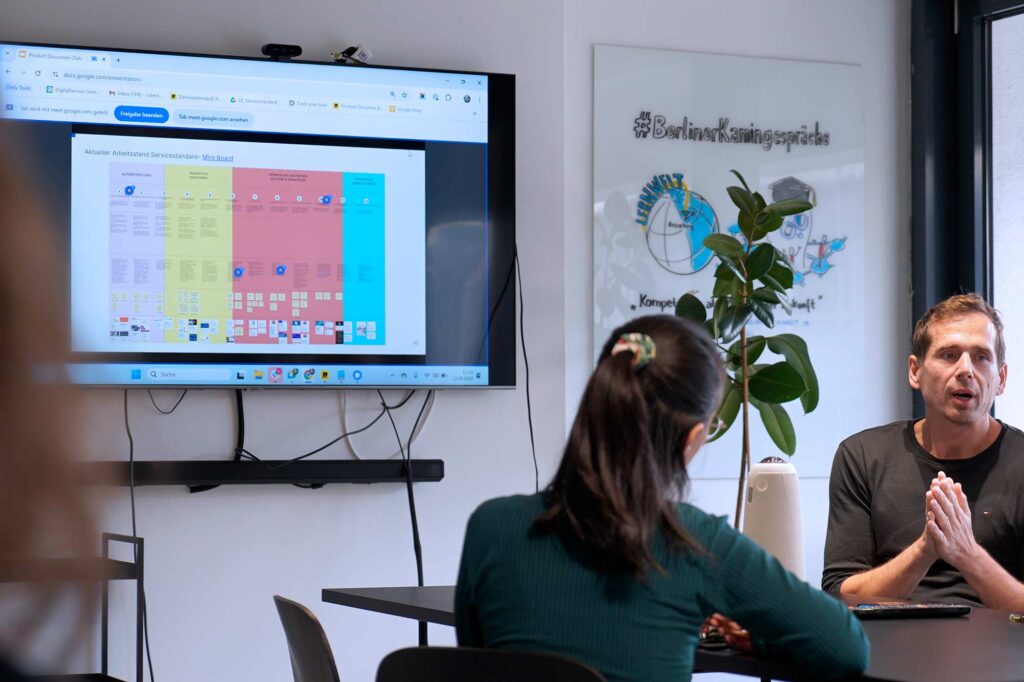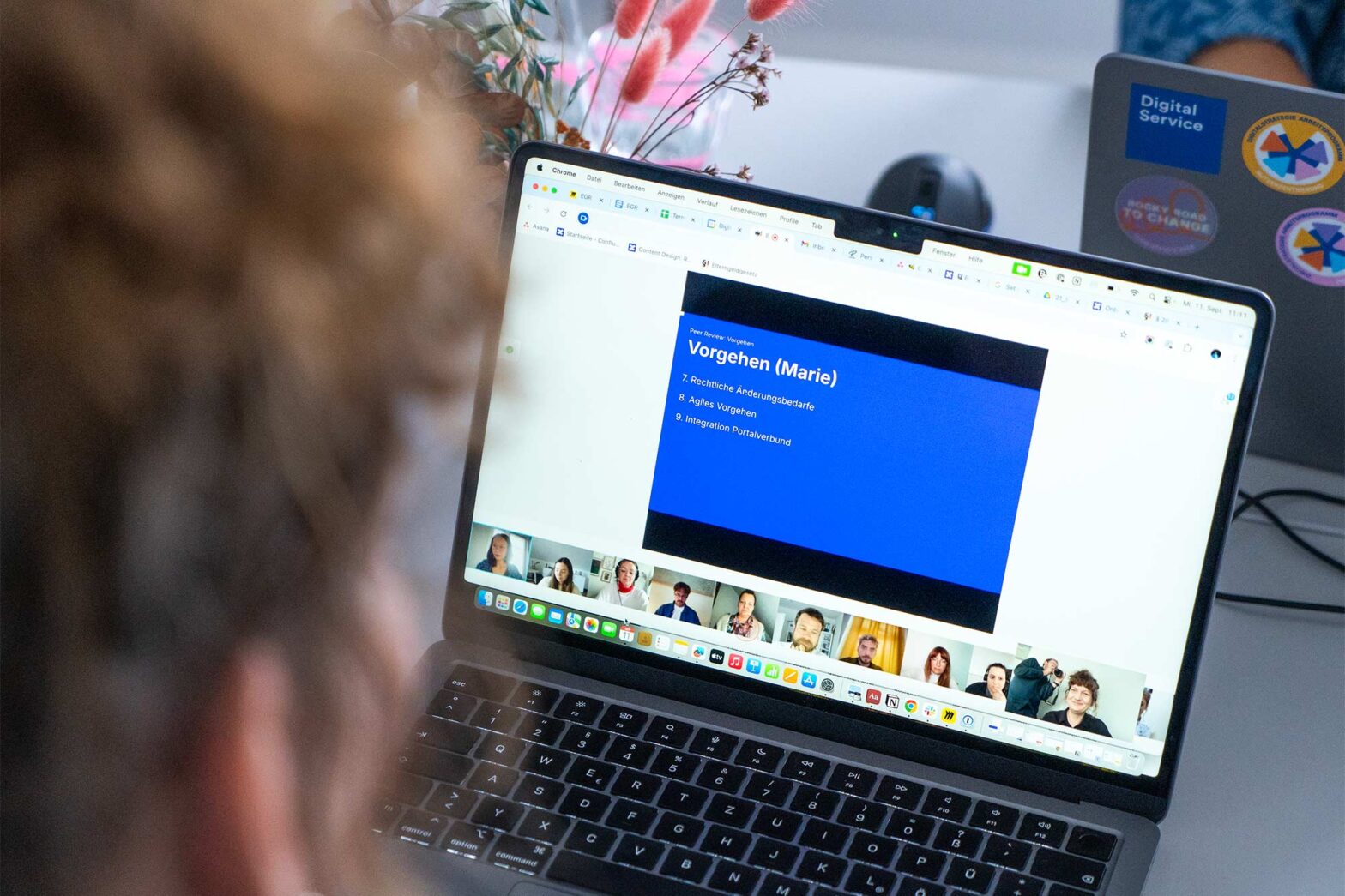This week, we broke new ground for the Service Standard – on multiple sites at once. We are working on a total overhaul of the Service Standard with the Federal Ministry of the Interior. Simultaneously, we starting to apply the existing standard across projects with 3 more ministries. That is a great honour and proper responsibility.
None of that we could ever do alone or in isolation. So, to enhance the application of the standard and widen the perspective, Kannika Thaimai and I ran the first peer review, which included peers from other public sector organisations.
Taking a cross-sector view of our services
We have been working towards it for over a year, and we were meant to start with external peers much earlier.
On Wednesday, Maria Formisano from Deutsche Rentenversicherung Bund joined us as a peer reviewer for design. It means we invite public sector colleagues to look at what we have done well and what we can do better. Our ministerial partners from the Federal Ministry of Family Affairs, Senior Citizens, Women and Youth joined as well – to co-present and participate in the review. That was another first and a demonstration of partnership and collaboration.
We have been running enough peer reviews now to develop a well-tested structure and routine for bringing in other people. Most of my colleagues from DigitalService have participated in previous peer reviews and written self-audits against the Service Standard or are at least reasonably familiar with the standard.
Yet another first was us remotely running the peer review. That was not intended but became necessary when various participants could not join in person. Luckily, we had some written notes from our UK colleagues who blogged about ‘How to run a remote service assessment’ at the onset of the pandemic. My colleague Kannika did the heavy lifting of restructuring the schedule and preparing everyone involved. We condensed the review to about 2 hours by pulling out the tech part and moving it into a pre-call. Again, that was something I have seen working well in the UK.
We have never seen more interest and engagement around the Service Standard in Germany before. The review of the parental benefits calculator is the second of a lighthouse project of the government’s digital strategy. A third one will happen in October. It will be yet another premiere: the first-ever review of a service not developed at Digital Service.
We plan to write up all our learnings with the peer reviews in the coming weeks. It will be a proper piece of guidance combined with a blog post. We see evidence of demand for it.
The increased attention shows that our persistence pays off. With discipline, our teams at Digital Service have continuously applied the Service Standard across all work on digital services for years. With the experience gathered since Digital Service’s inception, I dare to assert that we are uniquely equipped to advance the standard.
Reviewing the structure draft of an updated Service Standard
We are now delighted and excited to work on the next version of the Service Standard.
My colleagues Robert and Stefan have conducted 25 interviews with subject matter experts and users across the public sector so far. I had the chance to be the notetaker in some of them. They will do dozens more until the end of the year.
From the interviews, they extracted the first suggestions covering 4 areas: improved content, awareness, application, and implementation – and shared them with our ministerial partners, the sounding board and also in a joint session of our delivery disciplines. With all of these sessions, it’s been a dense Service Standard week.
At the earliest point, we took a sharp look at the Service Standard‘’’s rewritten structure. Product managers, designers, user researchers, and transformation managers came together for a joint Thursday discipline weekly session. Robert walked us through the sketched structure, gave some context to the work, and left plenty of space for feedback. Everyone asked plenty of questions, left meticulous comments, and ran short of time.

This work continues – with the highest level of outside exchange. Because it requires it. Until 23 September, people can sign up for our public workshop as part of the PIAZZA conference. I hope many people do and we get a good level of engagement.
We plan to share the draft on OpenCoDE, the German public sector’s open-code platform, before that date.
Talking about salaries openly
You will not find any salary range in 99.5% of German job ads. That’s been bugging me for years.
It took some time, but this week, my colleague Anna-Lisa, heading up the people team, shared a blog post about our salary system. It’s a detailed one, as she takes the time to explain how her team developed it and created a new level system.
In the blog post, she shares what we pay at these levels.
The level matching the regular level for design and user research starts at 45,500 EUR. The level for most senior roles starts at 72,000 EUR and goes up to 97,500 EUR. The level for our principals starts at 84,500 EUR with a maximum of 114,000 EUR. These are not private sector big tech salaries. But these are very decent salaries by any measure.
I am grateful these numbers are published and that the process of agreeing on them is documented in the open. We started sharing the blog post with people in the application process, and they seemed grateful for it.
The next thing we need to do is add the salary ranges to individual job ads. We took our content design and user research offline as we successfully filled the roles. Once we open up new ones, I expect the levels and related salary bands to be part of the job ad.
What’s next
I will be off on Monday and Tuesday.
I will attend the ‘Service Design in Government’ conference in Edinburgh from Wednesday to Friday. After speaking for the last 2 years, I will attend without contribution this year. I will sit quietly to take notes and chat a lot with people I mostly see on the internet throughout the year.
Throughout the week, I plan to work on the new issue of the Service Gazette, which we have to finish by the end of the month for the Helsinki conference.
Got my copy, too! @richardpope.org’ ‘Platformland’ arrived. I’m looking forward to digging into his anatomy of next-gen public services. With trust in democratic governments worldwide decreasing, now is a crucial moment to discuss and implement bold ideas to change people’s experience.
— Martin Jordan (@martinjordan.com) September 15, 2024 at 11:56 AM
[image or embed]
Also, Richard Pope’s book ‘Platformland’ arrived. I hope to find time to start reading it.

